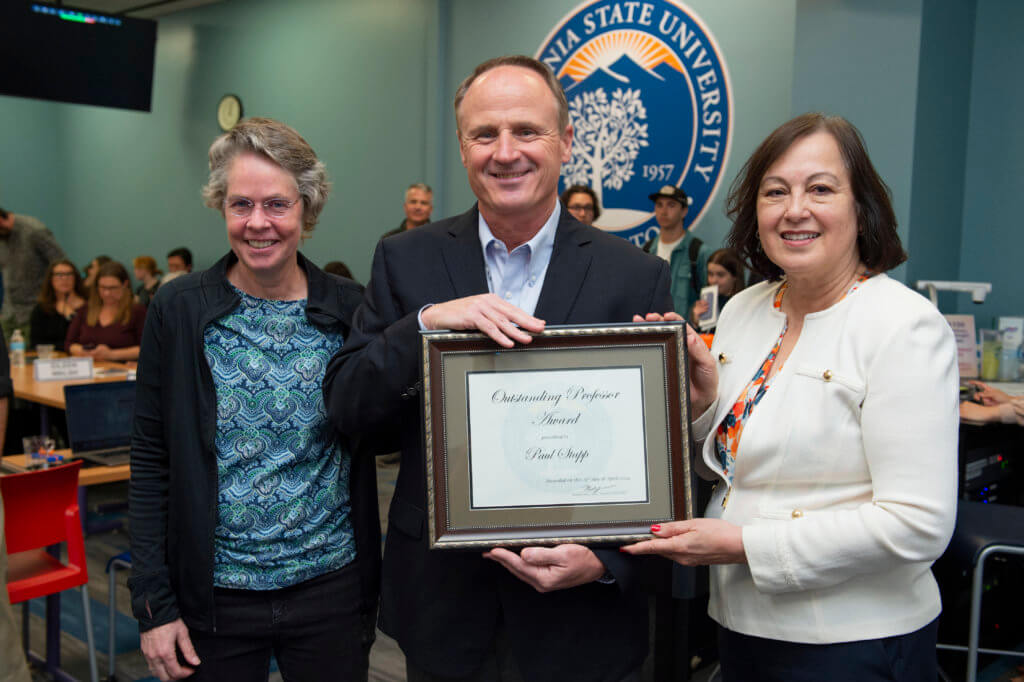
Over the past two decades, Cal State Fullerton ecologist Paul Stapp has researched the ecology of wild mammals, including the impacts of bubonic plague on prairie dogs and effects of mice on nesting seabirds on the Channel Islands.
Colleagues and students describe Stapp, professor of biological science, as one of the best ecologists and mammalogists and an exemplary educator in the classroom and in the field.
For his exceptional teaching, scholarship and contributions to the university and the California State University system, Stapp is the recipient of Cal State Fullerton’s 2024 Outstanding Professor Award.

“Paul is clear, concise and calm, yet rigorous in the classroom and creates a positive learning environment,” said William “Bill” Hoese, professor of biological science and 2021 Outstanding Professor, who nominated Stapp. “He shines as an instructor and uses hands-on approaches in the field.”
Stapp’s former students also praise his commitment to his field and extraordinary work as a scientist and teacher.
“Dr. Stapp’s dedication to teaching and mentorship was evident in every lecture and discussion, and his passion for the field of mammalogy was infectious,” said Lauren Simpson ’13 (B.S. biological science), a senior wildlife biologist for an environmental consulting firm who researched bat activity and diversity with Stapp.
“His positive presence and influence have greatly enhanced my life, academic progress and professional career.”
Veterinarian Kim Conway, who studied bot-fly parasitism of ground squirrels under Stapp, also credits him for her career success as a veterinary research scientist at the California Department of Public Health.
“What has always stood out to me about Dr. Stapp is that he wholeheartedly cares deeply about his students and truly wants them to succeed lifelong,” said Conway ’14 (B.S. biological science, health science).
Outstanding Scholarship in Ecology
Stapp has received nearly $2 million for 71 external grants and contracts for his teaching and research activities. His diverse research program includes studies of invasive species, wildlife infectious diseases, urban ecology and the roles of animals in desert, grassland and island ecosystems.
He has authored over 100 publications, including peer-reviewed articles, with many research papers co-authored by his students, and has given more than 140 conference presentations.
Stapp has trained dozens of students to become ecologists and biologists and developed a biological science curriculum to ensure student success.
For Stapp, the most rewarding part of his career has been advising students to become independent researchers, which to date totals 23 undergraduates and 32 graduate students in biology and environmental studies.
He has guided students’ investigations on such projects as the dynamics of human and coyote interactions in local communities, pathways of rodenticide exposure for urban coyotes and using contraception to control Catalina Island’s bison herd.
“My students and I investigate how human activities, such as livestock grazing, pest management, and roads and light pollution affect the persistence of wildlife populations — and how these problems can be mitigated,” said Stapp, who holds a doctorate in zoology from Colorado State University and joined CSUF in 2002.
He has also advised students in the Southern California Ecosystems Research Program on projects such as investigating the effects of runoff water on the presence of Argentine ants in natural areas and how nest predation affects songbirds.
Outstanding Teaching and Service
During his tenure, Stapp has taught ecology, vertebrate zoology and wildlife biology courses. He currently teaches introductory ecology and conservation biology classes and a course that provides intensive field experiences for students. He regularly teaches a research design and professional development course for new graduate students.
Stapp is passionate about improving the quality and stature of graduate education at CSUF and is a past chair of the Academic Senate Graduate Education Committee. Since 2006, he has served as adviser of the biology graduate program.
His service activities include chairing the CSUF Institutional Animal Care and Use and Graduate Education committees and representing the CSU system on a state board reviewing wildlife pest research.
Last year, he was recognized with the President’s Special Award for Service from the American Society of Mammalogists for his work as publications director for the society’s two scientific journals.
Stapp shared that he is honored to receive the university’s top faculty award.
“I am so grateful to the faculty and staff in the department and college for fostering such a positive and supportive environment,” he said. “I feel fortunate to have worked closely with many gifted and special research students and professional colleagues over the past two decades. Hearing how our interactions were meaningful to them is heartwarming — and an unexpected gift.”